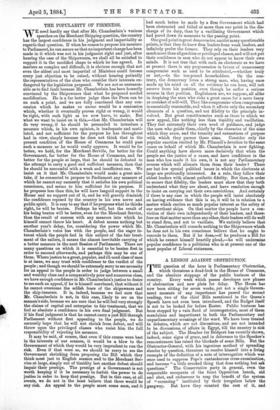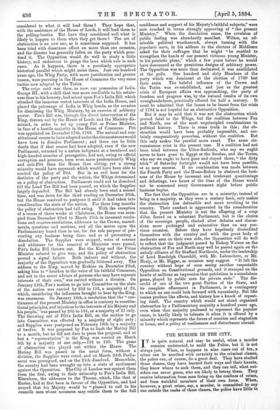A LESSON AGAINST OBSTRUCTION.
THE question of the hour is Parliamentary Obstruction, which threatens a dead-lock in the House of Commons, and the absolute stoppage of the public business of the country. Every week which passes developes new phases of obstruction and new plots for delay. The House has now been sitting for seven weeks, yet not a single Govern- ment measure of any importance has passed the second reading, two of the chief Bills mentioned in the Queen's Speech have not even been introduced, and the Budget itself is not to be looked for before Easter. Public business has been stopped by a vain flood of interrogatories, most of them scandalous and impertinent in both the Parliamentary and unparliamentary meanings of the word. We have been treated to debates, which are not discussions, and are not intended to be discussions, of affairs in Egypt, till the country is sick of the subject. The Member for Bridport has recently shown, indeed, some signs of grace, and in deference to the Speaker's remonstrances has raised the blockade of some Bills. But the Obstructor-General, with his ingenious method of spreading slander by question, threatens to resolve himself into a living example of the definition of a note of interrogation which was once used to suppress Pope's cantankerous cross-examination, and become "a little crooked thing that does nothing but ask questions." The Conservative party in general, even the respectable occupants of the front Opposition bench, aid and abet, and endeavour to reap the benefit of the system of " cornering " instituted by their irregulars below the gangway. But have they counted the cost of it, and
considered to what it will lead them ? They hope that, with the assistance of the House of Lords, it will lead them to the polling-booths. But have they considered well what is likely to happen to them when they get there? The art of obstruction is no new one, as is sometimes supposed. It has been tried with disastrous effect on more than one occasion, and the disaster has generally fallen on the party which prac- tised it. The Opposition would do well to study a little history, and endeavour to gauge the laws which rule in such cases. As it happens, there is a peculiarly appropriate historical parallel which might assist them. Just one hundred years ago, the Whig Party, with more justification and greater reason, were pursuing in the House of Commons the very same tactics now adopted by the Tories.
The origo mall was then, as now, our possession of India. George III., with a skill that was more creditable to his astute-
ness than to his honesty, had seized upon Fox's India Bill, which attacked the immense vested interests of the India House, and placed the patronage of India in Whig hands, as the occasion for dismissing the Whig Ministry, by an exercise of arbitrary power. Fox's Bill was, through the direct intervention of the King, thrown out by the House of Lords, and the Ministry dis- missed, in order to set up young Pitt as Prime Minister, in face of a hostile majority in the House of Commons. Pitt was appointed on December 17th, 1783. The natural and con- stitutional course to have adopted under the circumstances would have been to dissolve Parliament ; and there can be little doubt that if that course had been adopted, even if the new Parliament, returned by a nation indignant at a barefaced and
high-handed exercise of prerogative, had not, owing to official corruption and pressure, been even more predominantly Whig
and anti-Pitt than the House then sitting, yet a strong minority would have appeared, which would have been able to control the policy of Pitt. But in an evil hour for the destinies of the party and the nation, the Whigs determined on a policy of obstruction. Parliament could not be dissolved till the Land Tax Bill had been passed, on which the Supplies largely depended. The Bill had already been read a second time, and was down for the third reading on December 20th, but the House resolved to postpone it until it had taken into consideration the state of the nation. For three long months the policy of obstruction had full swing. With the exception of a recess of three weeks at Christmas, the House was occu- pied from December 22nd to March 25th in incessant resolu- tions and counter-resolutions, addresses to the Crown, amend- ments, questions and motions, and all the moves upon the Parliamentary board then in use, for the sole purpose of pre- venting any business being done, and so of preventing a dissolution. The Supplies were stopped, votes of censure and addresses for the removal of Ministers were passed, Pitt's India Bill thrown out. But the King and the Prime Minister refused to give way, and the policy of obstruction proved a signal failure. Both indoors and without, the majority of the Opposition was gradually frittered away. The address to the King, moved by Erskine on December 22nd, asking him to "hearken to the voice of his faithful Commons, and not to the secret advices of persons who may have separate interests of their own," was carried without a division. On January 12th, Fox's motion to go into Committee on the state of the nation was carried by 232 to 193, a majority of 39, • which, considering the influences brought to bear by the King, was enormous. On January 16th, a resolution that the "con- tinuance of the present Ministry in office is contrary to constitu- tional principles, and injurious to the interests of his Majesty and his people," was passed by 205 to 184, or a majority of 21 only. The throwing out of Pitt's India Bill, on the motion to go into Committee, was effected by a majority of eight only ; and Supplies were postponed on February 18th by a majority of twelve. It was proposed by Fox to limit the Mutiny Bill to a month, but he did not dare to press the proposal, and at last a "representation" to the King was carried on March 8th by a majority of one only,-191 to 190. The game of obstruction was played out within the House. The Mutiny Bill was passed in the usual form, without a division, the Supplies were voted, and on March 24th Parlia- ment was prorogued, and on the 25th dissolved. Meanwhile, the country had been wrought up into a state of excitement against the Opposition. The City of London was against them from the first, owing to their animosity to Fox's India Bill. Elsewhere, the addresses to the Throne, which, like that of Exeter, had at first been in favour of the Opposition, and had prayed that his Majesty would be "pleased to call to his councils men whose measures may entitle them to the full confidence and support of his Majesty's faithful subjects," were now couched in terms strongly approving of "the present
Ministry." 'When the dissolution came, the revulsion of public feeling was abundantly manifest. Wilkes, an ad- mirable political weathercock, always turning with the popularis aura, in his address to the electors of Middlesex asked for their suffrages that he might "be enabled to strengthen the hands of our present virtuous young Minister, in his patriotic plans," which a few years before he would have denounced as the pernicious designs of arbitrary power. The Opposition was more than decimated, it was annihilated at the polls. One hundred and sixty Members of the party which was dominant at the election of 1780 lost
their seats. The baleful influence of the Crown and the Tories was re-established, and just as the greatest crisis of European affairs was approaching, the party of freedom and progress was, by the natural results of its own wrongheadedness, practically effaced for half a century. It must be admitted that the lesson to be learnt from the crisis of 1784 is not hopeful for an obstructive Opposition.
But it may be said that it was not the obstruction which proved fatal to the Whigs, but the coalition between Fox and North, one of the most unprincipled combinations in political history. There is some truth in this ; the ob- struction would have been probably impossible, and cer- tainly comparatively powerless, without the coalition. But this only makes the parallel more exact. The same cir- cumstances exist in the present case. If a coalition had not been tried between the Ultra-Radicals, who say we ought never to have gone' to Egypt or the Soudan, and the Tories, who say we ought to have gone and stayed there, "the dirty trick" of Saturday fortnight would not have been possible, or so near success. If no combination was made between the Fourth Party and the Home-Rulers to obstruct the busi- ness of the House by incessant and irrelevant questionings and debatings, two hours of the time of the House would not be consumed every Government night before public business begins.
The fact that the Opposition are in a minority, instead of being in a majority, as they were a century back, only makes the obstruction less defensible and more revolting to the country. Their conduct is aggravated by the consideration that the present Ministry is not the offspring of a coup d'état, forced on a reluctant Parliament, but is the choice of the sovereign people, elected after debates and discus- sions more prolonged and exhaustive than on any pre- vious occasion. Before they have hopelessly discredited themselves with the country and with the great body of
moderate men on their own side, the Opposition will do well to reflect that the judgment passed by Bishop Watson on the obstruction of Fox and North may well be passed again on the unholy alliance of Sir Stafford Northcote, under the leadership of Lord Randolph Churchill, with Mr. Labouchere, or Mr.
Healy, or Mr. Biggar, as occasion may suggest. "It left the
country without hope of soon seeing another respectable Opposition on Constitutional grounds, and it stamped on the
hearts of millions an impression that patriotism is a scandalous game, played by public men for private ends." The dis- credit of one of the two great Parties of the State, and its complete effacement in Parliament, is a contingency to which no one could look forward with equanimity. But like causes produce like effects, and history has a knack of repeat- ing itself. The country which would not stand organised obstruction by a Parliamentary majority a hundred years ago, even when that majority professed to represent the popular cause, is hardly likely to tolerate it when it is offered by a minority which represents the forces of reaction and stagnation at home, and a policy of restlessness and disturbance abroad.















































 Previous page
Previous page